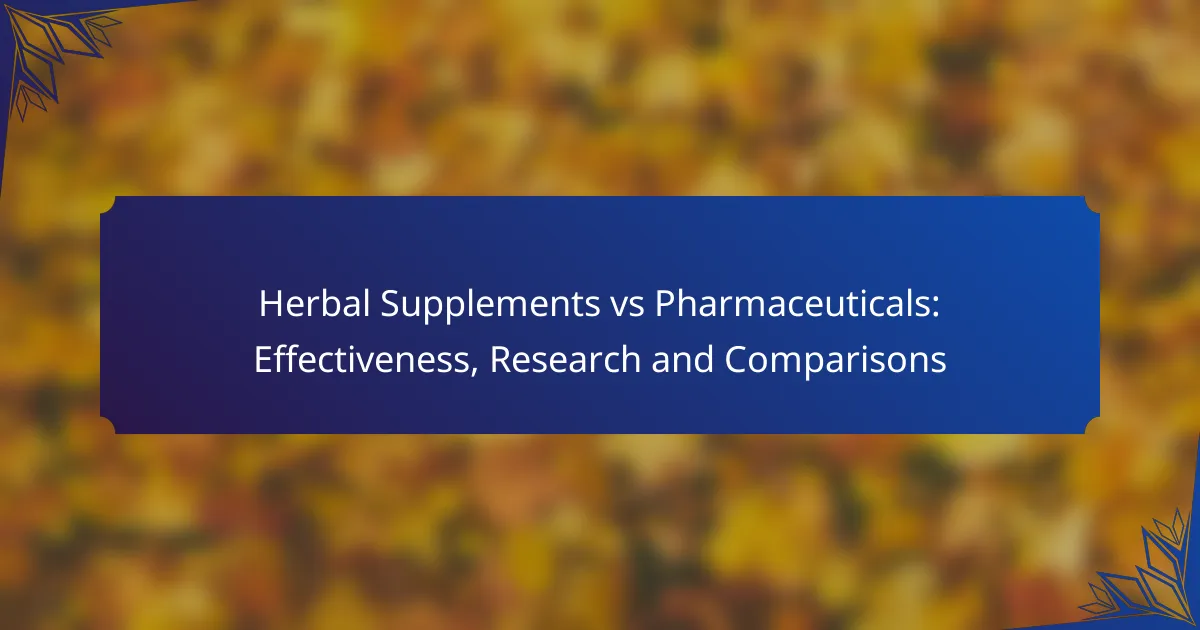The debate between herbal supplements and pharmaceuticals centers on their effectiveness and reliability. While herbal products may offer natural benefits, pharmaceuticals are generally backed by rigorous testing, ensuring consistent results. Research on herbal remedies varies, with some studies highlighting their potential for treating common ailments, often in comparison to conventional drugs. Ultimately, individuals may choose herbal options for their holistic approach and perceived lower side effects.
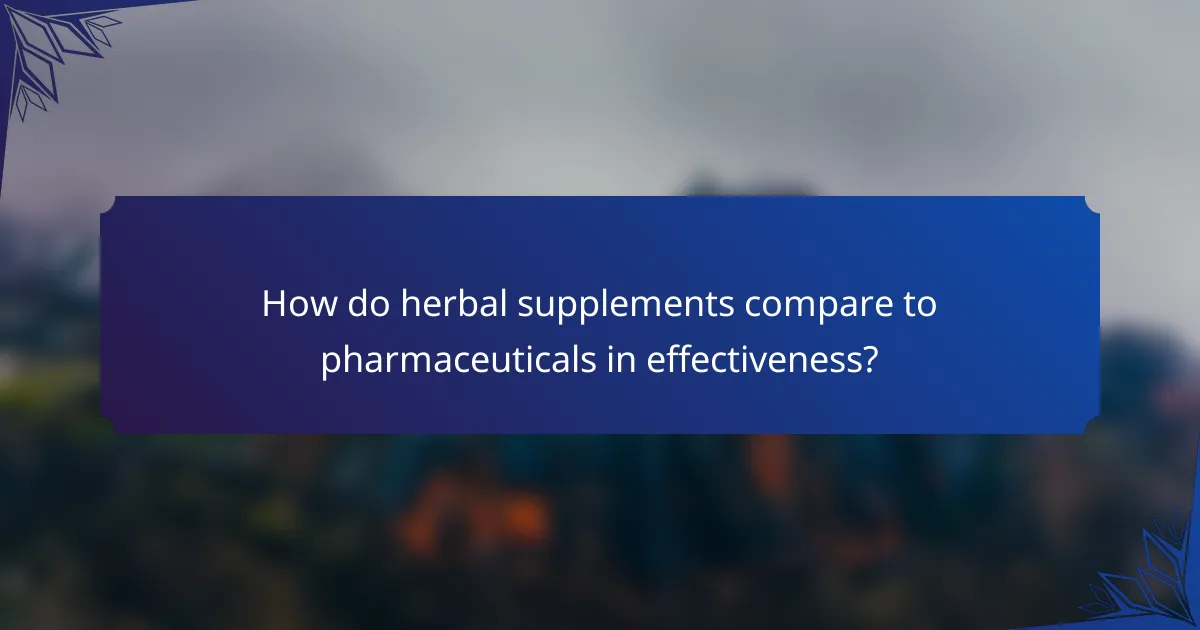
How do herbal supplements compare to pharmaceuticals in effectiveness?
Herbal supplements and pharmaceuticals differ significantly in their effectiveness, with each having unique benefits and limitations. While some herbal products may provide health benefits, pharmaceuticals typically offer more reliable and consistent results due to rigorous testing and standardization.
Herbal supplements show varying effectiveness
The effectiveness of herbal supplements can fluctuate widely based on factors such as the specific herb, preparation method, and individual response. For instance, while ginseng may enhance energy levels for some, others may not experience any noticeable effects. Quality control is also a concern, as the concentration of active ingredients can vary between products.
Consumers should be cautious and do thorough research before choosing herbal supplements. Consulting with a healthcare professional can help determine the appropriateness and potential interactions with other medications.
Pharmaceuticals generally have standardized efficacy
Pharmaceuticals are developed through extensive clinical trials that establish their efficacy, safety, and dosage. These drugs are subject to strict regulations, ensuring that each batch contains a consistent amount of the active ingredient. This standardization leads to predictable outcomes for patients, making pharmaceuticals a reliable choice for treating various conditions.
For example, a common pain reliever like ibuprofen has well-documented effects and dosing guidelines, making it easier for healthcare providers to recommend. In contrast, the variability in herbal supplements can lead to uncertainty regarding their effectiveness and safety.
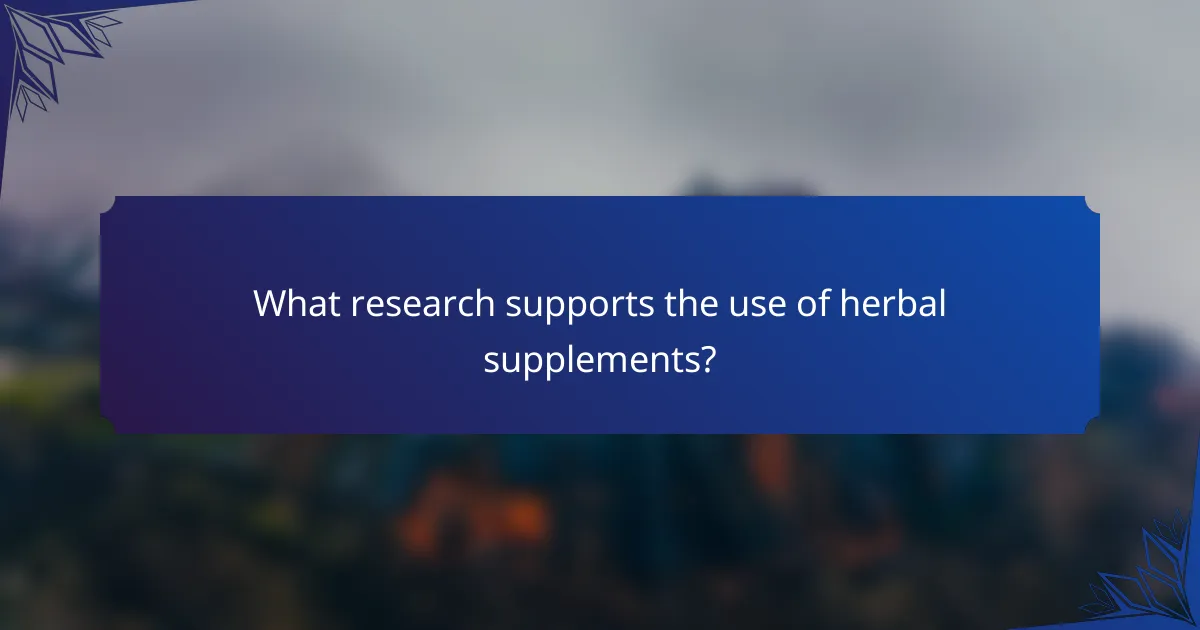
What research supports the use of herbal supplements?
Research on herbal supplements varies widely in quality and focus, with some studies showing promising results while others lack rigorous methodology. Key areas of investigation include the effectiveness of specific herbs for common ailments, often compared to conventional pharmaceuticals.
Clinical studies on echinacea for colds
Clinical studies on echinacea have explored its potential to reduce the duration and severity of colds. Some trials suggest that echinacea may shorten colds by about one to two days, particularly when taken at the onset of symptoms. However, results are mixed, with some studies showing little to no benefit compared to a placebo.
When considering echinacea, it is important to choose standardized extracts to ensure consistent dosages. Users should also be aware of potential side effects, such as gastrointestinal discomfort or allergic reactions, especially in individuals with allergies to plants in the daisy family.
Meta-analysis of St. John’s Wort for depression
Meta-analyses of St. John’s Wort indicate it may be effective for mild to moderate depression, often showing comparable results to standard antidepressants. These analyses typically report that St. John’s Wort can improve symptoms in about 50-70% of patients, making it a viable option for some individuals seeking alternatives to pharmaceuticals.
However, users should exercise caution as St. John’s Wort can interact with various medications, including birth control and blood thinners. Consulting a healthcare provider before starting this supplement is crucial to avoid adverse interactions and ensure safe use.

What are the benefits of herbal supplements over pharmaceuticals?
Herbal supplements offer several advantages over pharmaceuticals, including a more natural composition and potentially fewer side effects. Many people turn to herbal remedies for their holistic approach to health, aiming to address underlying issues rather than just symptoms.
Natural ingredients with fewer side effects
Herbal supplements are often derived from plants and contain natural ingredients, which may lead to fewer adverse reactions compared to synthetic pharmaceuticals. For instance, while common medications can cause side effects like nausea or fatigue, herbal options like ginger or peppermint tend to be gentler on the stomach.
However, it is essential to recognize that “natural” does not always mean safe. Some herbal supplements can interact with medications or have their own side effects, so consulting a healthcare provider is advisable before starting any new supplement regimen.
Holistic health benefits beyond symptoms
Herbal supplements often focus on promoting overall wellness rather than just alleviating specific symptoms. For example, adaptogens like ashwagandha may help reduce stress and improve energy levels, addressing the root causes of fatigue rather than merely masking it.
This holistic approach can lead to improved mental clarity, better sleep, and enhanced immune function. When considering herbal supplements, look for those that support multiple aspects of health, as this can provide a more comprehensive benefit compared to traditional pharmaceuticals that target specific conditions.

What are the risks associated with herbal supplements?
Herbal supplements can pose several risks, including contamination, mislabeling, and interactions with prescription medications. Users should be aware of these potential dangers to make informed choices about their health.
Potential for contamination and mislabeling
Herbal supplements are not always subject to the same rigorous testing as pharmaceuticals, which increases the risk of contamination with harmful substances or incorrect labeling. Contaminants may include heavy metals, pesticides, or other drugs that could pose health risks.
Mislabeling can lead to consumers taking products that do not contain the advertised ingredients or that have incorrect dosages. This can diminish effectiveness or cause adverse effects. Always choose supplements from reputable manufacturers that adhere to good manufacturing practices.
Interactions with prescription medications
Herbal supplements can interact with prescription medications, potentially altering their effectiveness or increasing the risk of side effects. For instance, St. John’s Wort is known to reduce the effectiveness of certain antidepressants and birth control pills.
Before starting any herbal supplement, consult with a healthcare provider, especially if you are taking prescription medications. They can help identify potential interactions and advise on safe usage to avoid complications.

How to choose between herbal supplements and pharmaceuticals?
Choosing between herbal supplements and pharmaceuticals depends on various factors, including effectiveness, safety, and individual health needs. It’s essential to evaluate the specific condition being treated and consult with healthcare professionals to make an informed decision.
Consultation with healthcare professionals
Consulting with healthcare professionals is crucial when deciding between herbal supplements and pharmaceuticals. Doctors and pharmacists can provide insights into the efficacy and safety of treatments based on current research and clinical guidelines. They can also help identify potential interactions with existing medications.
When seeking advice, be prepared to discuss your health history, current medications, and any allergies. This information will help healthcare providers recommend the most suitable options tailored to your needs.
Consideration of individual health conditions
Individual health conditions play a significant role in the choice between herbal supplements and pharmaceuticals. Certain supplements may be beneficial for specific ailments, while others could exacerbate existing conditions. For example, individuals with liver issues should be cautious with herbs that affect liver function.
It’s important to assess the severity of the condition and the desired outcomes. For acute issues, pharmaceuticals may offer quicker relief, while herbal supplements might be more appropriate for chronic management. Always consider the potential side effects and consult with a healthcare provider before starting any new treatment.
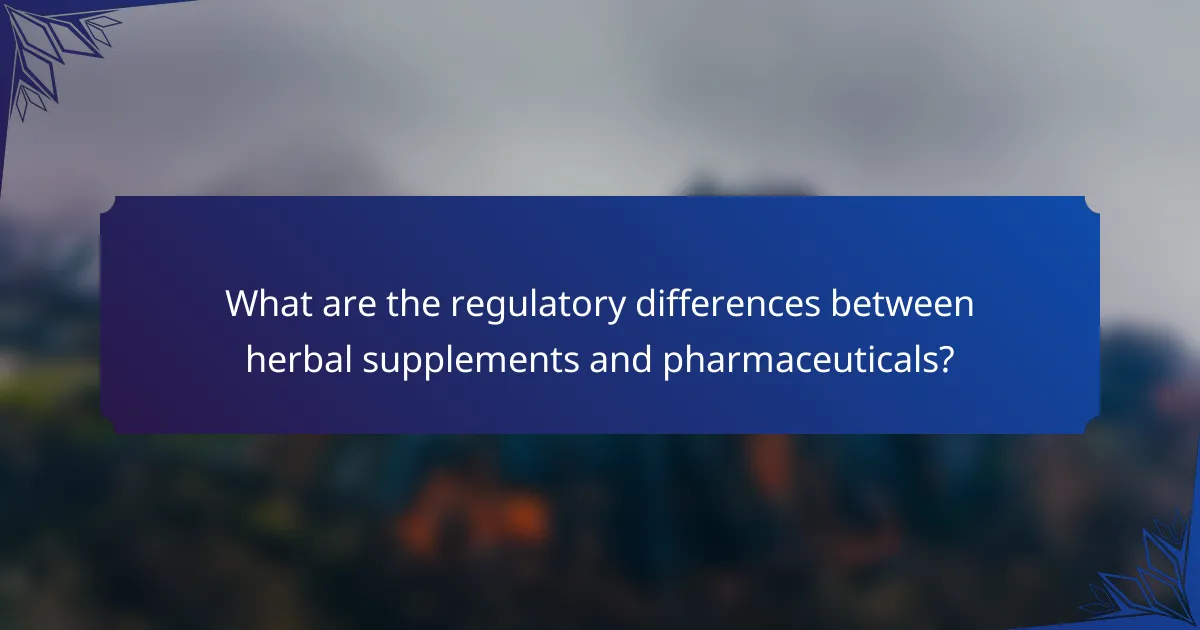
What are the regulatory differences between herbal supplements and pharmaceuticals?
Herbal supplements and pharmaceuticals differ significantly in their regulatory oversight. While pharmaceuticals undergo stringent testing and approval processes, herbal supplements are generally less regulated, leading to variations in quality and efficacy.
Herbal supplements are less regulated in the US
In the United States, herbal supplements fall under the Dietary Supplement Health and Education Act of 1994, which classifies them as food products rather than drugs. This means they do not require pre-market approval from the Food and Drug Administration (FDA), allowing manufacturers to market their products without extensive evidence of safety or effectiveness.
Due to this lack of regulation, the quality and concentration of active ingredients in herbal supplements can vary widely. Consumers should be cautious and look for products that have been verified by third-party organizations, such as the United States Pharmacopeia (USP) or NSF International, to ensure quality.
Pharmaceuticals require rigorous testing and approval
Pharmaceuticals must undergo a comprehensive process before they can be sold to the public, which includes multiple phases of clinical trials to assess their safety, efficacy, and side effects. The FDA requires substantial evidence from these trials before granting approval, ensuring that the drugs meet strict standards.
This rigorous testing process can take several years and involves thousands of participants. While this ensures a high level of safety and effectiveness, it also means that pharmaceuticals can be significantly more expensive than herbal supplements, often costing hundreds or thousands of dollars for a course of treatment.
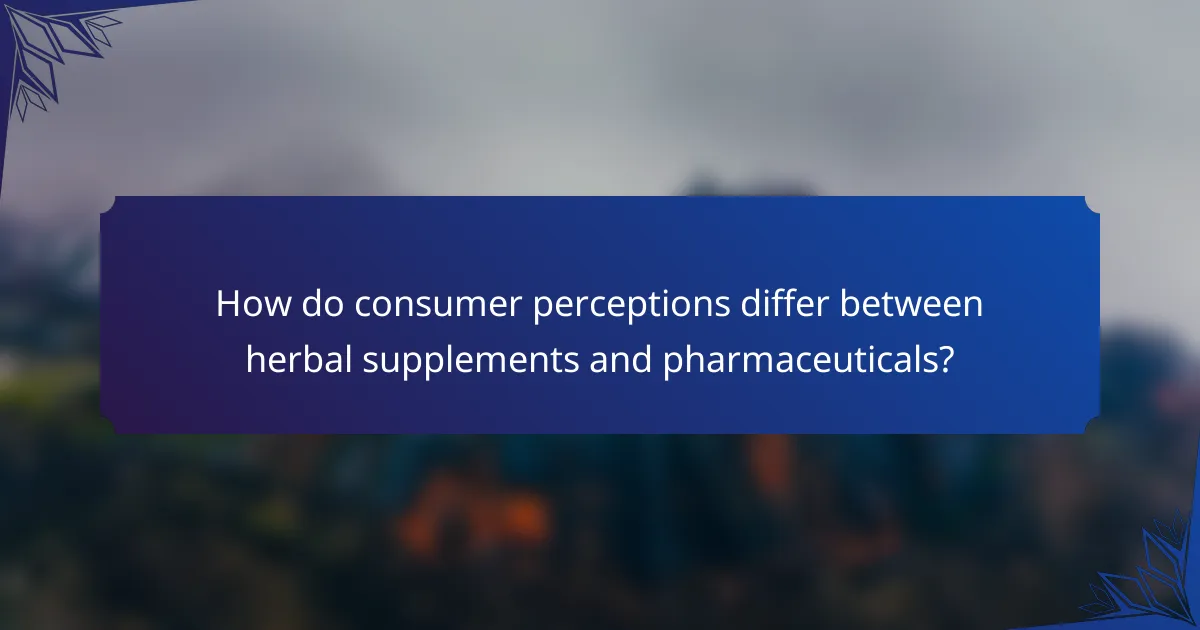
How do consumer perceptions differ between herbal supplements and pharmaceuticals?
Consumer perceptions of herbal supplements and pharmaceuticals often diverge significantly, with many viewing herbal options as more natural and safer, while pharmaceuticals are seen as more reliable and scientifically validated. This distinction influences choices, with individuals weighing personal beliefs about health and wellness against established medical practices.
Growing preference for natural remedies
Many consumers are increasingly leaning towards herbal supplements due to a growing belief in the benefits of natural remedies. This trend is often driven by the perception that herbal products are less likely to cause side effects compared to synthetic drugs.
For example, supplements like turmeric and ginger are popular for their anti-inflammatory properties, often preferred over pharmaceuticals for managing mild pain or discomfort. This preference reflects a broader cultural shift towards holistic health approaches, where individuals seek to treat ailments with natural solutions.
Trust in pharmaceutical brands for safety
Despite the appeal of herbal supplements, many consumers maintain a strong trust in pharmaceutical brands, primarily due to their rigorous testing and regulatory oversight. Pharmaceuticals undergo extensive clinical trials to ensure safety and efficacy, which can provide reassurance to those wary of unregulated herbal products.
Additionally, well-known pharmaceutical companies often have established reputations, which can influence consumer choices. For instance, when faced with serious health conditions, individuals may opt for prescription medications over herbal alternatives, valuing the perceived reliability and scientific backing of pharmaceuticals.
